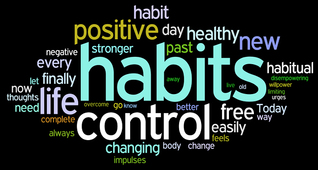
Wikipedia defines a habit as a routine of behavior that is repeated regularly and tends to occur unconsciously. It is said that 40% our daily behaviour is a habit. Habits give our brains a break and make us feel in control. When we change habits we change our lives. In Gretchen Rubin's new book Better Than Before she talks about how to change or create habits.
She stresses how important it is to know yourself and part of that knowledge is to recognize yourself in 1 of the 4 Tendancies:
Upholders - respond well to inner and outer expectations. They tend to follow rules no matter what.
Questionners - question all expectations and only tend to meet them if justified.
Obligers - respond more readily to outer expectations but struggle with inner expectations. Do well if they are accountable to somethng or someone.
Rebels - resist all expectations - prefer to do their thing on their own terms.
Gretchen goes on to suggest further questions to consider when getting know yourself:
Are you a morning person or a night person? No use attempting a daily 6:00 am jogging habit if you are a night person.
Do you get things done quickly at the last minute, take your time or simply ignore as long as possible?
Do you tend to buy, buy, buy or do you make do?
Do you prefer simplicity or over abundance?
Do you tend to finish projects or simply come up with ideas?
Do you love familiarity or do you thrive on change?
Do you look at how you could gain from something (promotion-focused) or do you view it from a the angle of preventing loss or problems (prevention-focused)?
How do you spend your time?
What do you value?
Once you know how you operate, mindfully choose what habits you would like to change or create in a manner that best compliments your characteristic traits. It is said that it take 66 days to develop a habit.
Ms. Rubin discusses some strategies that can help encourage the formation of a healthy habit.
Monitor - measure your progress. ex. keep a food journal, wear a pedometer, make a quantitative goal for the day, track your TV watching time
Foundation - choose habits that will have a positive affects in other areas of you life. ex. good sleep habits encourage better control over eating and exercising habits
Scheduling - habits grow stronger and faster when they are scheduled into our daily lives. It takes less brain work or self-control when your habit is predictable and set in stone.
Accountability - you are more apt to stick with it when their are consequences to be faced. ex. deadlines, wasted gym fees, late fees, poor grades, coach expectations
Abstinence/Abstain - sometimes you have to give up something completely as apposed to moderation ex. very few of us can eat only a few potato chips. Perhaps the alternative is to find a similar but healthier crunchy snack.
Convenience/Inconvenience - make the habit a little easier to follow
ex. buy or make pre-prepared meals, make a rule to smoke outside only, keep all electronic devices and TV's out of the bedroom, bring gym clothes to work
Pairing - try to incorporate the habit with other activities. ex. standing up when you are talking on the phone, taking the stairs instead of the elevator at work or in your apartment building, getting up to talk to a co-worker instead of just sending an email all the time
Safeguard - come up with a plan before hand if temptation is anticipated
ex. eat some protein before a dinner party, wait 15 minutes if a craving strikes, don't buy coffee at 3 pm at your favourite donut shop, don't book appointments when your scheduled to go to the gym
Beware of Loopholes - excuses to get rid of the good habit
ex. I can eat more because I exercised
I can hold off cleaning my room because I am going to do a major cleaning on the weekend
It is a party so I can let go and drink and eat as much as I want
I've been good so I can take the a day off
Treats - reward yourself with treats (non-caloric) to help with self-control ex. watch that movie, go to that game, buy that piece of clothing, get your nails or hair done, get that massage
Extrinsic motivators (rewards from the outside) are not as effective as intrinisic motivators (self-directed drive) when it comes to transforming a behaviour into a well ingrained habit.
Upholders - are motivated by the need for a source of control
Questionners- are inwardly driven by their natural curiosity about things
Obligers - are encouraged by cooperation, competition and recognition
Rebels - are self-driven by a challenge
Gretchen's book goes into more detail and more antidotes on the subject of changing habits. I on the other hand will sum things up by saying:
Mindfully decide on what habit you want to create, get to know yourself and your characteristic traits and take things one small step at a time. Know from the start that good habits take time and effort but in the long run the benefits far out weigh the cost - so make a habit of it.
She stresses how important it is to know yourself and part of that knowledge is to recognize yourself in 1 of the 4 Tendancies:
Upholders - respond well to inner and outer expectations. They tend to follow rules no matter what.
Questionners - question all expectations and only tend to meet them if justified.
Obligers - respond more readily to outer expectations but struggle with inner expectations. Do well if they are accountable to somethng or someone.
Rebels - resist all expectations - prefer to do their thing on their own terms.
Gretchen goes on to suggest further questions to consider when getting know yourself:
Are you a morning person or a night person? No use attempting a daily 6:00 am jogging habit if you are a night person.
Do you get things done quickly at the last minute, take your time or simply ignore as long as possible?
Do you tend to buy, buy, buy or do you make do?
Do you prefer simplicity or over abundance?
Do you tend to finish projects or simply come up with ideas?
Do you love familiarity or do you thrive on change?
Do you look at how you could gain from something (promotion-focused) or do you view it from a the angle of preventing loss or problems (prevention-focused)?
How do you spend your time?
What do you value?
Once you know how you operate, mindfully choose what habits you would like to change or create in a manner that best compliments your characteristic traits. It is said that it take 66 days to develop a habit.
Ms. Rubin discusses some strategies that can help encourage the formation of a healthy habit.
Monitor - measure your progress. ex. keep a food journal, wear a pedometer, make a quantitative goal for the day, track your TV watching time
Foundation - choose habits that will have a positive affects in other areas of you life. ex. good sleep habits encourage better control over eating and exercising habits
Scheduling - habits grow stronger and faster when they are scheduled into our daily lives. It takes less brain work or self-control when your habit is predictable and set in stone.
Accountability - you are more apt to stick with it when their are consequences to be faced. ex. deadlines, wasted gym fees, late fees, poor grades, coach expectations
Abstinence/Abstain - sometimes you have to give up something completely as apposed to moderation ex. very few of us can eat only a few potato chips. Perhaps the alternative is to find a similar but healthier crunchy snack.
Convenience/Inconvenience - make the habit a little easier to follow
ex. buy or make pre-prepared meals, make a rule to smoke outside only, keep all electronic devices and TV's out of the bedroom, bring gym clothes to work
Pairing - try to incorporate the habit with other activities. ex. standing up when you are talking on the phone, taking the stairs instead of the elevator at work or in your apartment building, getting up to talk to a co-worker instead of just sending an email all the time
Safeguard - come up with a plan before hand if temptation is anticipated
ex. eat some protein before a dinner party, wait 15 minutes if a craving strikes, don't buy coffee at 3 pm at your favourite donut shop, don't book appointments when your scheduled to go to the gym
Beware of Loopholes - excuses to get rid of the good habit
ex. I can eat more because I exercised
I can hold off cleaning my room because I am going to do a major cleaning on the weekend
It is a party so I can let go and drink and eat as much as I want
I've been good so I can take the a day off
Treats - reward yourself with treats (non-caloric) to help with self-control ex. watch that movie, go to that game, buy that piece of clothing, get your nails or hair done, get that massage
Extrinsic motivators (rewards from the outside) are not as effective as intrinisic motivators (self-directed drive) when it comes to transforming a behaviour into a well ingrained habit.
Upholders - are motivated by the need for a source of control
Questionners- are inwardly driven by their natural curiosity about things
Obligers - are encouraged by cooperation, competition and recognition
Rebels - are self-driven by a challenge
Gretchen's book goes into more detail and more antidotes on the subject of changing habits. I on the other hand will sum things up by saying:
Mindfully decide on what habit you want to create, get to know yourself and your characteristic traits and take things one small step at a time. Know from the start that good habits take time and effort but in the long run the benefits far out weigh the cost - so make a habit of it.



 RSS Feed
RSS Feed